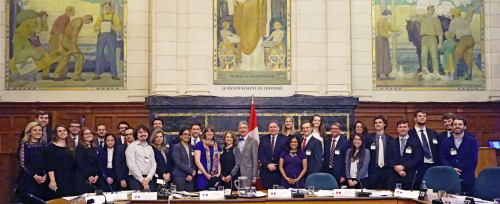Research
Most of Professor Poirier’s publications explore various aspects of federalism, the protection of minorities (notably linguistic ones), and, more broadly, public law. It is in the field of intergovernmental relations and cooperative federalism that her contributions are the most significant and original.
Her multidisciplinary methodological approaches combine legal technicality, institutionalism, socio-political contextualization, and legal theory (including normative pluralism) through a comparative lens – even in the study of Canadian constitutional law.
Over the coming years, Professor Poirier hopes – notably – to study the intersection between feminism and the transformations of institutional architecture in post-conflict societies; the role of judges in overseeing cooperative federalism; and the intergovernmental implications of the Truth and Reconciliation Commission of Canada (TRC).
Cooperative Federalism and Intergovernmental Relations:
What's Law Got To Do With It?
2019-2022 Research project funded by the Secrétariat du Québec aux relations canadiennes
In 2019-2022, Professor Johanne Poirier will be leading a major research project on intergovernmental relations and cooperative federalism.
The technical ramifications and legal implications of intergovernmental agreements, as well as their implementation, have been generally neglected by jurists. However, cooperative mechanisms crafted by the executives can have undeniable collateral effects on the scope of parliamentary scrutiny over the executive, on judicial review of administrative action and on the balance of federal architecture.
Professor Johanne Poirier will attempt to fill these doctrinal gaps by studying the law that emanates from, structures and affects intergovernmental agreements. She also plans to initiate a form of “catalogue” of cooperative techniques and of the role played by law in structuring them. While the project is focused on cooperative federalism in Canada, it will benefit from a comparative lens—analysing foreign experience being so often the best way of decoding the particularities of one’s own system.
Ultimately, her work harbors significant potential to provide answers to the various components of the Canadian federation on the uncertainties inherent to the modalities of intergovernmental cooperation, on the stability of cooperative mechanisms and on the courts’ responses to them.
Teaching
For any information on courses and registration at McGill Law, visit Law's Student Affairs Office page on Current Courses and Registration.
Constitutional Law (PUB2 101: 2020-2021, 2018-2019, 2017-2018, 2016-2017, 2015-2016)
First-year 2-term course. A treatment of the history, the theory and the practice of constitutional law. The powers of the legislative, executive and judicial branches are discussed in light of guiding principles such as constitutionalism, the rule of law, democracy, the protection of fundamental freedoms and minorities, and federalism. In French.

See entry in McGill's eCalendar: PUB2 101D1 - Constitutional Law & PUB2 101D2 - Constitutional Law
Comparative Federalism (PUB2 503: 2020-2021, 2018-2019, 2015-2016)
Despite the mishaps of some of its real-life incarnations, the “federal idea”, often summarised by the slogan “unity within diversity”, is frequently presented as one of the most effective ways of maintaining a degree of territorial and social cohesion in a state-like structure, without the disadvantages of forced homogeneity. To decipher the “federal phenomenon”, the course is divided into four parts. First, a brief introduction canvasses the origins of “the federal idea”, its normative underpinnings and some of the reasons which lead public actors to opt for federal solutions. Second, we will explore the many shapes and forms in which federalism can be « incarnated ». Third, we will address specific institutional arrangements that structure autonomy and interaction between federal actors (distribution of competences, second chambers and intergovernmental relations), from a comparative perspective. Fourth, guest speakers will provide a panorama of the risks and potential of of the “federal phenomenon”.
See entry in McGill's eCalendar: PUB2 503 - Comparative Federalism
Seminar in constitutional drafting and reform: "Modernizing" the Canadian Constitution (LAWG 539 Special Topics in Law | Advanced Questions in Constitutional Law)
This course took place in 2017, the year marking the 150th anniversary of the creation of the Canadian federation. Taught in collaboration with the Université de Montréal’s Law Faculty, this seminar brought about 30 students (15 from each faculty), alternating between McGill and Université de Montréal for 3-hour sessions.
The primary objective of the course was to “modernize” the Constitution of Canada: regroup its scattered sections (the multiple “constitutional laws” and their annexes) and propose potential modifications, notably to codify certain conventions, or even entrench certain principles. The main idea was to propose a “legible”, “living” and “contemporary” constitutional instrument. Some class sessions were be devoted to comparative law and Canadian constitutional history. Finally, exercises in preparation of a Constituent Assembly were run throughout the semester and concluded with a simulated constitutional assembly in Ottawa. Students were also expected (if possible) attend the Canadian Federalism and its Future conference , which took place on March 22-23, 2017. Read the resulting new constitution produced by the students: ![]() Class project: new text for the Canadian Constitution
Class project: new text for the Canadian Constitution

See entry in McGill's eCalendar: LAWG 539 - Specialized Topics in Law 20